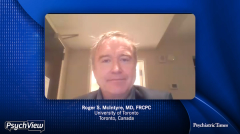
GABAergic Modulating Treatment Considerations in MDD
Roger S. McIntyre, MD, FRCPC, comments on the paradigm shift of the frequency of dosing in the treatment of MDD, highlighting GABAergic modulating treatments, as well as the use of therapy to improve mental health.
Episodes in this series

Roger S. McIntyre, MD, FRCPC: I think your point earlier is also well-taken. I don't think taking treatments intermittently or episodically is that much of a paradigm shift. And what I mean by that is just that the literature is consistent – 50[%] to 75% of people with MDD [major depressive disorder] depression are not taking their medications beyond 6 to 8 weeks as prescribed. So, it's a bit of a news alert. Most treatments are taken episodically. So, I think we're, I think that's just human nature. Obviously, we don't recommend that. We want people taking the medications as prescribed. But I guess what I'm getting at is, I think that the person with lived experience through their actions, actions speak louder than words, is saying to health care providers everywhere, “Guess what? I'm not going to take my medications every day who tell me chronic treatment is the rule of the game.” So, we know this, everyone knows this. And, so, that's, I think, just something I don't think is that much of a shocker. I think what's a bit different is that most of us in nursing school, social work, pharmacy, medicine, PA [physician assistant], whatever your professional training is, you've been told take antidepressants every day. And now we're saying you can take it more episodically. And, again, the rationale being is that we think that that ignites a set of biological events, a cascade of events that then can keep the patient well for longer. And, again, nothing's perfect. Some patients will require boosters. And I think that's going to be critical for everyone to be aware of, certainly for me, what I'm also thinking about out loud here, Carmen, is that in addition to having the rapid alleviation of symptoms, which of course we all welcome, a lot of patients we see are thinking about being [in] counseling or being in therapy like cognitive behavioral therapy or mindfulness or some other the protocols, evidence-based psychotherapy. And many people actually have a better outcome if they can combine medication with therapy. And certainly, again, this is not a scientific statement. This is more common sense, but it's also scientifically supported that if we can rapidly alleviate those symptoms in addition to getting reduced anxiety, sleep, depression reduced, that would position the person, I think, to participate in therapy more meaningfully than if they're just so burdened by depression or they're trying to do therapy at the same time.
Carmen Kosicek, MSN, PMHNP-BC: Onehundred percent agree, Dr McIntyre, could not agree more. I literally, on my charts when I see patients, they'll say, “Oh yeah, you know,” because it's that burden of yet another thing to do. They have to work. They're having to take care of the children. They have to go have their teeth cleaned. They're not even doing that. And then sometimes when you approach having therapy, it's a burden instead of positioning this where medication helps to lift up the depression to where they see hope and they prioritize where they need to spend their time, realizing the benefits of therapy. If it was as simple as a pill, man, we wouldn't even have time to film this, the line would be out the door, we would just be driving all day. But it's not as simple as a pill, and it's literally to work together, that cohesiveness to help the patient to, in turn, be able to have all these different types of modalities to truly help them with their mental health.
Transcript is AI-generated and edited for clarity and readability.
Newsletter
Receive trusted psychiatric news, expert analysis, and clinical insights — subscribe today to support your practice and your patients.








